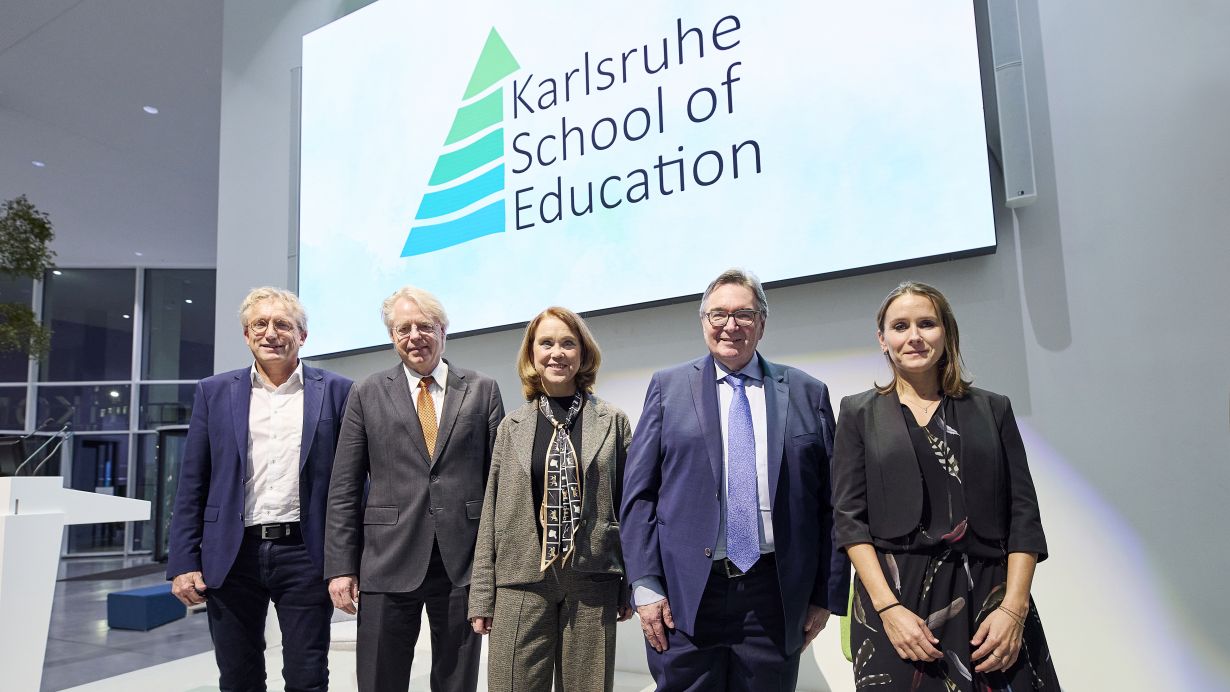
By founding the Karlsruhe School of Education (KSE), the Karlsruhe Institute of Technology (KIT) and the Karlsruhe University of Education (PHKA) are augmenting their long-standing, successful collaboration. The aim of their jointly operated academic institution is to develop new ideas for teacher education and expand their cooperation in learning, teaching, research, transfer, and promoting young talent. The KSE was officially founded at a ceremony yesterday (December 5, 2024), with Baden Württemberg's Minister for Science, Research, and the Arts, Petra Olschowski, in attendance.
View this album for photos of the event.
KIT and the PHKA have been collaborating successfully in teacher education for many years, including the relevant academic disciplines and their didactic methodologies as well as education sciences and teaching internships. The shared structures of a school of education promise further long-term synergy effects. KSE's main fields of activity will be digitalization, sustainability, STEM, health, and democracy education.
Particular beneficiaries of KSE's offerings will be the students, with each partner planning to make its courses more accessible for the other institution's students and instructors, to enhance the appeal of their many teaching and learning labs as beacons of teacher education in Karlsruhe and beyond, and to cooperate in attracting teaching degree students. A further aim is to strengthen cooperation in multi-university research activities (especially in didactic methodologies and education sciences) and in raising funds for innovative educational research.
New joint research units and research centers are also set to be established. Knowledge transfer, primarily benefiting everyday classroom work, will take place through publications and presentations at conferences in Germany and abroad. KSE will strengthen all phases of teacher education in Karlsruhe and Baden Württemberg.
KSE is headed by Professor Dr. Alexander Woll (KIT) and Professor Dr. Nadine Anskeit (PHKA). Collaboration with the other schools of education in Karlsruhe, the Zentrum für Schulqualität und Lehrerbildung (center for school quality and teacher education), the Karlsruhe-based institutions offering training and continuing education for teachers, and other bodies is arranged through KSE's council and advisory board.
Focus on Digitalization and Internationalization
"Qualified and dedicated teachers remain in high demand. Five established schools of education are making an important contribution to the scientific development of teacher education in Baden Württemberg, with a focus on topical issues such as digitalization and internationalization," said Baden Württemberg's Minister for Science, Research, and the Arts, Petra Olschowski. "Now the Karlsruhe University of Education and the Karlsruhe Institute of Technology are taking the next step by opening the Karlsruhe School of Education to expand their long-standing cooperation in the field of teacher education."
"The shared structures of the school of education provide ideal conditions for more capable and science-based teacher education and training," said Professor Jan S. Hesthaven, President of KIT. "With their practice-based combination of teaching and research, for example in the teaching and learning labs, KIT and the PHKA enable outstanding teacher education in the STEM subjects:"
"Karlsruhe is a unique and important location for teacher education in Baden Württemberg. With the Karlsruhe School of Education, the Karlsruhe University of Education and the Karlsruhe Institute of Technology will set a new course with pioneering ideas for teaching, research, transfer and internationalization. Our common focus will be on democracy education, digitalization, health, sustainability and STEM," said Professor Klaus Peter Rippe, Rector of the Karlsruhe University of Education.
Ausführliche Bildunterschrift: Improving teacher education (from left): Prof. Alexander Woll, Scientific Director of KSE-KIT; Prof. Jan S. Hesthaven, President of KIT; Petra Olschowski, Minister for Science, Research, and the Arts of Baden-Württemberg; Prof. Klaus Peter Rippe, Rector of PHKA; and Prof. Nadine Anskeit, Scientific Director of KSE-PHKA, at the founding ceremony for the Karlsruhe School of Education
Being "The Research University in the Helmholtz Association", KIT creates and imparts knowledge for the society and the environment. It is the objective to make significant contributions to the global challenges in the fields of energy, mobility, and information. For this, about 10,000 employees cooperate in a broad range of disciplines in natural sciences, engineering sciences, economics, and the humanities and social sciences. KIT prepares its 22,800 students for responsible tasks in society, industry, and science by offering research-based study programs. Innovation efforts at KIT build a bridge between important scientific findings and their application for the benefit of society, economic prosperity, and the preservation of our natural basis of life. KIT is one of the German universities of excellence.






